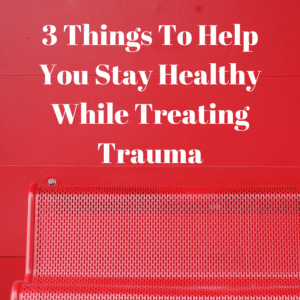
Knowing how to stay mentally healthy while helping clients through their trauma is vital to their healing and your health and wellness as their therapist. Many of you have heard the statement, “traumatized people traumatize others.” I believe that most clients do not intentionally set out to traumatize their therapist, but it can happen. Also, a client’s trauma story can sometimes trigger a therapist’s trauma history. As a trauma therapist, you are vulnerable to burnout due to the nature of the work you do on a consistent basis. It is important to have a plan to fight against burnout. Below, I will discuss how knowing your red flags, having clear boundaries, and practicing consistent self-care are all keys to staying healthy and fighting against burnout while treating trauma.
Burnout Is Real
I remember how it felt to be burnt out from doing trauma work. It was in the early stages of my career. I was working a full-time job during the day and running a part-time private practice in the evenings. The practice was solely dedicated to helping adopted children who had experienced horrific trauma and sometimes helping the adoptive parents who had been traumatized, unintentionally, by the children.
I was committed to the work and the families. I wanted to see the children and families heal, but I had no sense of what my red flags were for burnout. I am sure they were flying high and I did not know what to look for. Looking back, my number one red flag was that undeniable feeling of thinking I can help if I work harder and longer. I also didn’t have clear boundaries. I was constantly overly involved emotionally with my clients. Never unethical, of course, but just not healthy for me long-term. I ended up working harder than they did on several occasions. Last, but not least, I didn’t practice consistent self-care. I never had a well thought out self-care plan that I used to hold myself accountable. I would do something with my family or friends for self-care, but I wasn’t really working to be fully present in the moment. Over the years, through trial and error, I have learned there are things I must do to ensure my longevity, health, and wellbeing as a trauma therapist.
3 Things You Can Do
Having, what I like to call, guardrails along your niching journey as a trauma therapist is a great way to help you stay on course and maintain a healthy balance in your work life. Below are three things you can do to help you stay healthy while treating trauma.
- Know your red flags. Work to identify when you are overactivated. Overactivation looks different for each of us, but here are a couple of things you can consider: increase in anxiety, anger, worry, tiredness, disconnection, or isolation. I created a checklist to help you assess yourself. Download my Trauma Therapist Red Flag Checklist here to help you do a periodic check. Catching red flags, in the beginning, can help save a lot of work on the back end.
- Establish boundaries. By the nature of the work you do, having empathy is a given. A therapist can not effectively provide services without having empathy for their clients. Therefore, it is imperative to have well-established boundaries, especially when it comes to your emotional energy and how much of it you give to your clients. It is easy with trauma survivors to find yourself in a rescuer role, which can easily lead to you working harder than the client. This is an unhealthy place to be.
- Practice consistent self-care. Self-care is only beneficial when you are practicing it consistently. You might be asking, well who has time, money, or energy to do self-care on a consistent basis? I truly believe that self-care is moment by moment and in the small things, as much as it is in the things that take a lot of time, money and energy. When you think about self-care being in the small things, consistency feels possible. For example, I try to wear my favorite color, listen to my favorite song, eat my favorite treat, or wear my favorite fragrance. While these are small things they are things I can do with little time, money, or energy; therefore, I am more likely to be consistent over time. These consistent small things can add up to make a huge impact on your health and wellbeing.
I understand how easy it is to find yourself tired and burnt out, as a trauma therapist. Working with traumatized individuals can take a toll on you. Having clearly identified things to help you stay as healthy as possible is essential. Take time to know your red flags well. Establish boundaries that keep you clear about how far you will go with a client. Lastly, practice consistent self-care by engaging in the pleasurable small things in life. If you do these three things, you will be well on your way to staying healthy as you continue to make trauma therapy your niche.
Comment below: What’s your number one red flag to burnout?

